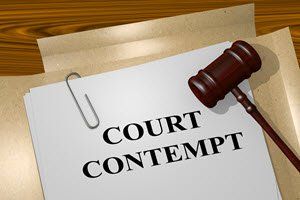
There are several types of contempt, and a criminal contempt offense is a class A misdemeanor. Some of these include direct, indirect, and vindictive contempt. In this article, we’ll take a look at the different types. We’ll also talk about the consequences of each type.
Constructive contempt
A crime of constructive contempt occurs when an individual obstructs the work of a court. This offense is more serious than direct contempt. It requires the defendant to specify exactly what he or she has done in violation of the court order. A court may issue an order to show cause or issue a warrant if the defendant fails to comply. The order may be served by a sheriff or other law enforcement officer. The court may also make an order or impose a fine.
While this type of case may sound serious, it isn’t as common as it seems. It’s more common on television than in real life. Most prosecutors have never handled one of these cases. Furthermore, it’s not clear what a prosecutor needs to prove in order to successfully convict someone of a crime of constructive contempt.
Indirect contempt
A crime of indirect contempt is a serious offense that involves coercion and punishment. There are specific procedures for bringing an indirect contempt citation in court. It must be brought by the state, be separate from the civil case underlying it, provide a jury trial, and include certain information.
The punishment for an indirect contempt is often a fine, but the actual punishment may vary. The penalty can include a jail sentence of 30 days. In most instances, however, the punishment is only 30 days in jail.
Indirect contempt of court
Indirect contempt of court is a criminal offense that occurs when a person disobeys a court order. The order may require that a person do something, such as appear at a certain time or place. Indirect contempt is not a civil crime, but it is considered a crime because it occurs outside of court. Indirect contempt is punishable by fines and jail time. The best way to avoid this type of criminal offense is to follow the court order.
A citation for indirect contempt should set forth specific information and the time and place where the court hearing will occur. The citation should be issued orally by a judge in open court in the defendant’s presence. If the defendant refuses to comply with the court order, the court may issue an arrest warrant. If the court finds the defendant to be in contempt of court, he or she is entitled to a jury trial.
Vindictive contempt
In the U.S., vindictive contempt is a crime that can result in prison time and a fine. It is often used to punish others for a crime, and has the potential to be very serious. Under the law, a person is convicted of this offense if they intentionally damage the reputation of a law enforcement officer or prosecutor. Vindictive contempt can be punished in multiple ways, but the most common is with a fine.
The power to punish for contempt rests with the courts. In deciding whether a person is in contempt of court, a court must follow its own procedures, and must make findings to support its decision. Once a contempt conviction is made, it is final, and cannot be questioned on appeal.
